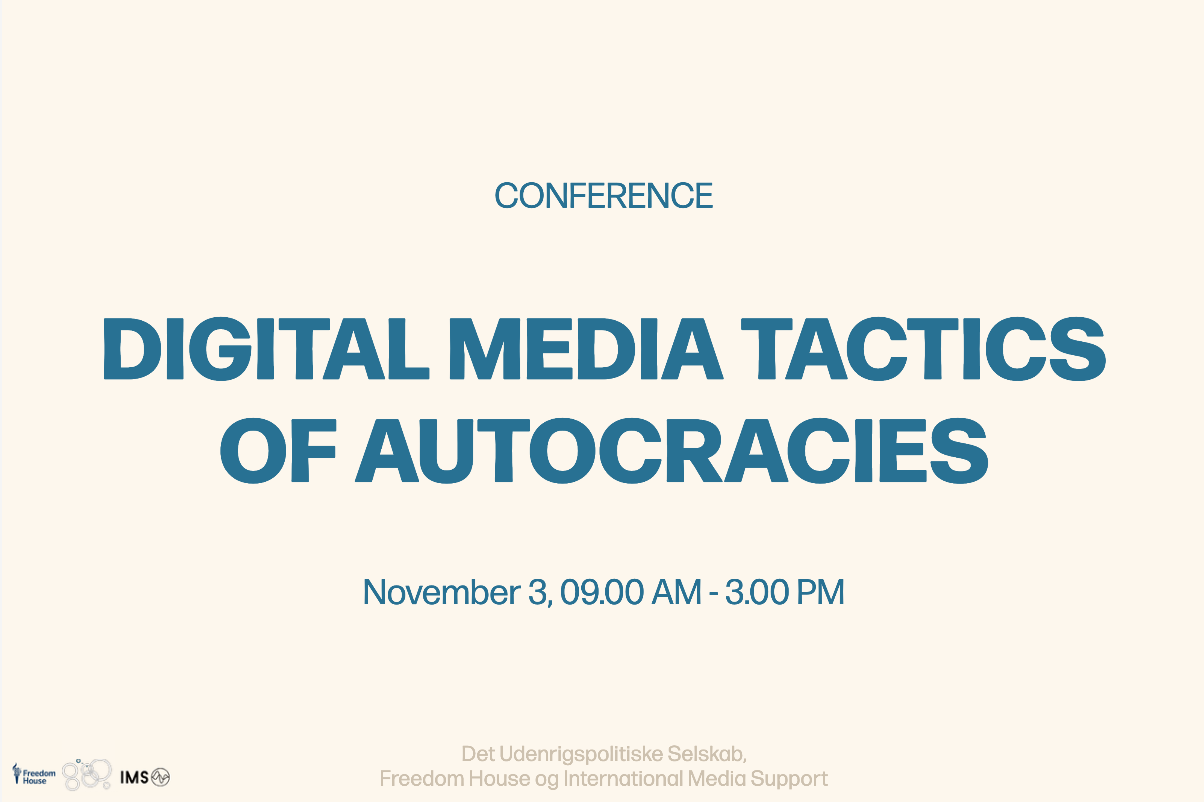
- Denne begivenhed er allerede afholdt.
Digital Media Tactics of Autocracies
3. november 2022 kl. 9.00 - 15.00 CET

The Danish Foreign Policy Society, Freedom House and International Media Support will host the international conference Digital Media Tactics of Autocracies this November in Copenhagen.
Two decades ago, digital media was hailed as a pathway to freedom, knowledge and democracy. When the world’s citizens would be free to connect and to search for the truth about their own societies and the world, the walls around the last autocracies would crumble.
But today, more and more governments are not only blocking and filtering online content, but some are actively using digital media and online platforms to promote their political agenda, both at home and around the world, by spreading disinformation, propaganda and lies.
The surge in illiberal and autocratic governments has been accompanied not only by the rise of new “digital iron curtains”, blocking access to outside information and limiting the possibilities for dissent and opposition, but increasingly also by aggressive and self-assured media tactics that seek to disrupt and dismantle the public debate of democratic states.
Recent examples from e.g. Russia show that traditional media such as television still is a key factor in shaping public opinion in authoritarian regimes. But the internet plays a crucial role for great parts of the populations as well as for those in the political opposition and in civil society who are familiar with the means of filter circumvention.
Still, the question remains whether digital media and the internet still has the potential to fulfill its promise of empowerment or whether it will become yet another tool of repression.
We are thankful for the support provided by the US Embassy and Hermod Lannungs Fond.
PROGRAM
9:00 – 9:30 AM Coffee and registration
9:30 – 9:45 AM Welcome
– Charlotte Flindt Pedersen, Director, The Danish Foreign Policy Society.
– Allie Funk, Research Director, Technology, Democracy, Freedom House.
– Gulnara Akhundova, Head of Department, Global Response, International Media Support.
9:45 – 11:00 AM Session 1: How Digital Media Became a Problem
This sessionwill explore three current themes in digital media politics: The decline in global online freedom concurrent with the rise of authoritarian state power over digital media, the legal problems and dilemmas faced by states and tech companies, and how the internet is increasingly becoming a wellspring for disinformation, hate, and mistrust in democratic institutions.
– Allie Funk, Research Director, Technology, Democracy, Freedom House: Global Trends
in Internet Freedom – Freedom on the Net 2022.
– Rikke Frank Jørgensen, Senior Researcher, The Danish Institute for Human Rights:
Human Rights in the Age of Platforms.
– Valentyna Shapovalova, PhD Fellow, Department of Communication, University of Copenhagen: Russian Media, Censorship andWar Propaganda.
Moderator: Charlotte Flindt Pedersen, Director, The Danish Foreign Policy Society.
11:00 – 11:30 AM Coffee Break
11:30 AM – 12:45 PM Session 2: Media Tactics of Autocracies
This session focuses on how autocracies have become more assertive in their use of the internet: They have not only created a “digital iron curtain” for the population, blocking access to outside information, but are also deliberately using digital media to undermine human rights around the world and to enhance their own global agenda.
– Christopher Walker, Vice President for Studies and Analysis, The National Endowment for Democracy: Digital Authoritarianism’s Threat to Democracy.
– Yevgeniy Golovchenko, Post.Doc., Department of Political Science, University of Copenhagen: Disinformation and Information Control during Russia’s Invasion of Ukraine.
– Jane Møller Larsen, Sub-Regional Head, West Africa, International Media Support: Media, Disinformation and Opinion Formation in Africa.
Moderator: Eva Grambye, Managing Director, Gaia Advice.
12:45 – 1:30 PM Lunch
1:30 – 2:45 PM Session 3: How Can Tech Help Digital Activism?
This session focuses on ways to counter digital authoritarianism, and how democracies can help support freedom of expression and freedom of information online. When regulating to address online harms and other genuine challenges, democracies face a risk that their laws undermine human rights and that they could be co-opted by more illiberal or authoritarian governments to limit fundamental freedoms. Can we envision a future where democracies help digital platforms protect human rights online and maintain a free and open internet?
– Fenja Yamaguchi-Fasting, Deputy Director, Department for Humanitarian Action, Civil Society and Engagement, Danish Ministry of Foreign Affairs: The Tech for Democracy Initiative.
– Sergey Parkhomenko, Journalist, Publisher and Senior Advisor, Kennan Institute of the Woodrow Wilson Center for Scholars: Russian Free Journalism in the Age of War and Totalitarian Repression: The Experience of Digital Resistance.
– Esben Gadsbøll, Chairman of the Board, Co-Initiator, Danish Tech Startups: Tech’s Role
and Responsibilities.
Moderator: Line Grove Hermansen, Head of Communication, International Media Support.
2:45 – 3:00 PM Wrap-up and Concluding Remarks
